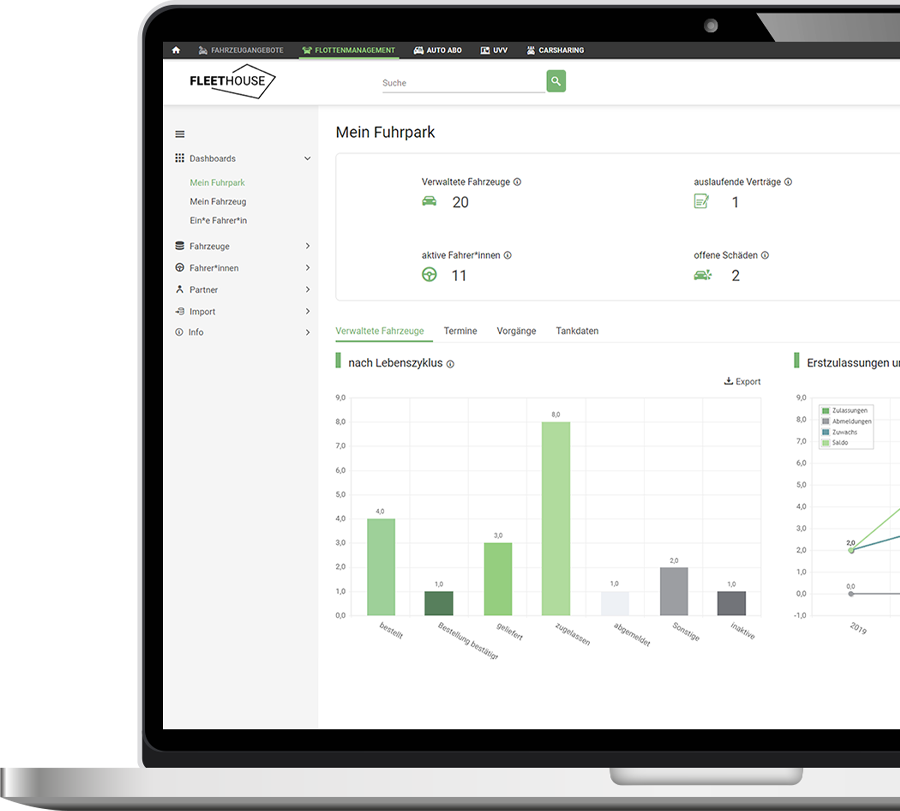A modern vehicle fleet involves many tasks: Vehicles must be procured, managed and operated in a legally compliant manner. At the same time, the requirements for cost-effectiveness, digitalization and sustainability are increasing. If you want to maintain an overview and manage processes efficiently, you not only need experience, but also the right expertise.
Training as a fleet manager lays the foundation for this. It teaches practical content relating to fleet management and prepares you specifically for the daily challenges.
But what exactly does such a qualification involve? What skills are required and for whom is it particularly worthwhile to start? In this article, we give you an overview.
Contents
What does a fleet manager do?
A fleet manager is responsible for the entire organization and management of the company’s fleet. The central tasks include using all vehicles economically and efficiently, complying with legal regulations and ensuring that day-to-day business runs smoothly.
This is by no means just about managing cars. Fleet managers control processes relating to the procurement, maintenance and decommissioning of vehicles, take care of driving license checks and ensure that all operational requirements are met. Coordination with drivers, workshops and internal departments is also part of their everyday work.
In many cases, they also take on strategic tasks in fleet management, such as selecting suitable mobility solutions, analyzing vehicle costs and implementing measures to increase efficiency. Organizational skills are particularly important for larger fleets – as is a good understanding of economic relationships.
A qualified fleet manager therefore plays a key role in the company: He or she combines technical expertise with legal security and makes a significant contribution to ensuring that the fleet is operated reliably, in compliance with regulations and cost-efficiently.
Free webinar
In our free webinar, you will receive valuable tips on what to look out for when managing a vehicle fleet – from owner liability to the right form of financing.

Why further training in fleet management makes sense
The vehicle fleet is a key cost and success factor in many companies. At the same time, the demands on fleet managers are constantly increasing: new legal requirements, digital tools, alternative drive concepts and the desire for greater efficiency are significantly changing their daily tasks. Sound further training in fleet management helps to master these challenges competently.
Those who undergo further training not only strengthen their specialist knowledge, but also expand their own skills in dealing with complex fleet processes. Topics such as owner liability, economical vehicle use, digital administrative processes and the efficient coordination of drivers are just as much a part of this as current regulations on road safety and sustainability.
Further training is also crucial for personal development: it creates the basis for positions of responsibility, provides comprehensive know-how and increases career prospects – both for prospective and experienced fleet managers. In many cases, it is also a prerequisite for a certified qualification in fleet management.
In short, anyone who not only wants to manage their fleet but also actively shape it will benefit in the long term from targeted training in fleet management.
Fleet manager training: Contents, structure and formats
In-depth training as a fleet manager provides the necessary knowledge to efficiently manage vehicles, drivers and processes. The aim is to prepare participants in a practical way for the organizational, legal and economic requirements of fleet management.
The contents are usually wide-ranging. These include, among others:
- Legal bases, e.g. owner liability, driver’s license check and legal regulations
- Organization and management of the vehicle fleet
- Economic aspects such as cost control, vehicle procurement and leasing models
- Claims management and maintenance
- Digitalization in the vehicle fleet, including tools and software solutions
- Strategic alignment of the fleet with regard to mobility and sustainability
Depending on the provider, the training takes place as a classroom seminar, online course or in hybrid formats. The duration varies – from compact training courses lasting several days to part-time courses with a final examination and certificate.
A certified fleet manager benefits in the long term: the training not only creates security in everyday life, but also promotes a deeper understanding of processes, procedures and strategic decisions relating to the fleet.

Requirements for qualification as a fleet manager
If you are looking to qualify as a fleet manager, you should not only have an interest in the subject but also certain personal and professional requirements. After all, the work in fleet management is varied, demanding and involves a great deal of responsibility.
In principle, no specific professional qualification is required, but participants with a commercial, technical or logistics background will benefit. Practical experience in the management of vehicles or in the organization of operational processes is also an advantage.
Important personal characteristics are:
- Organizational talent and reliability
- Understanding of economic relationships
- Interest in vehicles, mobility and digitalization
- Willingness to undergo regular further training
Depending on the provider, there may be additional entry requirements – such as professional experience or some previous knowledge of fleet management. Some programs conclude with an examination and a recognized certificate. For companies, a certified qualification is often an important signal of professionalism and competence in fleet management.
Webinar for fleet managers
Find out how you can get started with digital fleet management and make additional cost savings.
Changing requirements: What modern fleet managers need to bring to the table today
The demands placed on fleet management are constantly evolving. Digitalization, legal requirements and new mobility concepts are presenting fleet managers with growing challenges. Anyone working as a fleet manager today needs more than just organizational talent: strategic skills, economic thinking and legally compliant action are required.
Qualified further training not only imparts theoretical specialist knowledge, but also provides practical preparation for day-to-day work. Whether it is the selection of suitable company cars, compliance with regulations or the regular checking of driving licenses – professional training creates security and clarity. Topics such as owner liability, claims management and mobility management are also becoming increasingly relevant.
A certified fleet manager knows the processes in the company, can manage procurement processes economically and use digital tools efficiently. At the same time, reliable handling of driver and vehicle data is a prerequisite. Those who have these skills strengthen road safety, reduce risks and position themselves as an indispensable interface within the company.
A sound knowledge of fleet management is essential for the efficient management of a fleet – and this is precisely where practical seminars come in, providing targeted preparation for the tasks of modern fleet managers.
Career prospects and salary for fleet managers
With the increasing importance of fleet management, the career opportunities for qualified fleet managers are also growing. Companies are increasingly looking for specialists who can take on responsibility and reliably organize the management of their vehicle fleets. Those with in-depth knowledge of vehicle fleets and mobility have good prospects of long-term and varied tasks.
The profession offers prospects in many sectors: from SMEs to large companies, from logistics to public administration. Working as a fleet manager can also be an attractive development for career changers with technical or commercial experience.
The salary depends, among other things, on:
- Company size and industry
- Number of vehicles serviced
- Professional experience and qualifications
- Taking on strategic tasks in fleet management
With completed further training and appropriate responsibility, salaries between 40,000 and 60,000 euros gross per year are realistic. In managerial positions or with larger fleets, income can also be significantly higher.
The combination of specialist knowledge, organizational talent and economic thinking makes the job of fleet manager a sought-after position with good prospects.
Arrange an online consultation appointment
Arrange your personal consultation appointment now. You can easily select a suitable appointment using our booking tool.

Anne Fuchs

Ciara Lazeta
The most important facts about fleet manager training
The fleet manager training provides theoretical knowledge and practical skills to manage the fleet efficiently and safely.
Qualified fleet managers maintain an overview of vehicles, legal obligations and processes, make well-founded decisions and ensure orderly processes.
Certified fleet managers increase professionalism, minimize risks and make mobility in the company sustainable and future-proof.
FAQ - Frequently asked questions about fleet manager training
It provides practical expertise in fleet management, legal principles, economic processes, vehicle procurement, maintenance, claims management and the organization of efficient processes.
It provides support in complying with owner liability, driving license checks, UVV inspections and other operational regulations – and ensures that the vehicle fleet is always operated in compliance with the law.
This training course is ideal for people with organizational talent who want to take on responsibility in the fleet sector or specifically expand their skills in fleet management.
Salaries vary depending on the size of the company, area of responsibility and experience. On average, the annual salary is between 40,000 and 60,000 euros – or more if you have extensive responsibility.
Yes, especially with increasing requirements and growing vehicle fleets. The qualification improves career prospects and enables more efficient, legally compliant administration.
He is responsible for the planning, management and optimization of the vehicle fleet – from procurement and maintenance to deployment control, in compliance with legal and economic framework conditions.
What is required is specialist knowledge, reliability, analytical thinking, organizational skills, a confident use of digital tools and a good understanding of economic relationships.
This includes the procurement, management and maintenance of vehicles, cost control, driving license checks, claims management, compliance with legal regulations and strategic decisions relating to mobility and efficiency.
Further Fleet Knowledge
If you liked this article and would like to know more about this topic, we recommend these articles.


Vehicle management: importance in the fleet and helpful tips

Car subscription: When is it usefull for your company?

E-car as a company car: taxes, costs and insurance
Further blog articles
Owner liability in the fleet: what fleet managers should bear in mind
Fleet insurance for your vehicle fleet: this is what matters
Fleet management: how to manage your fleet efficiently
Software for fleet management providers: Carano in comparison with Fleethouse
Build up a vehicle fleet: How companies get off to an efficient and cost-saving start
Test fleet management software free of charge – manage more efficiently, get started more easily
Duties in the Fleet: UVV Instruction for Drivers
Claims management: 1×1 for fleet managers
Taxing company cars: requirements and tax advantages
Leasing return in the event of damage: tips for fleet managers
The company car: advantages, challenges and future prospects
Fuel cards for companies: Advantages, functions and tips for use
Basic areas of fleet management





